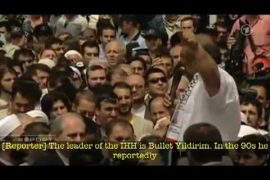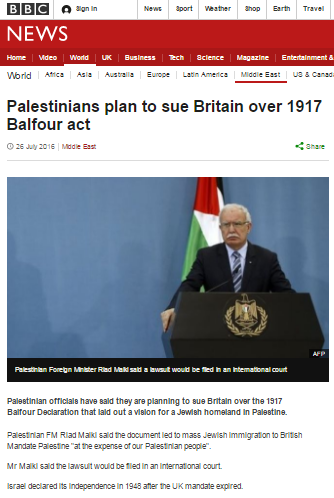Listeners to BBC World Service radio on May 20th heard two long reports from Tim Franks in two separate editions of the ‘Newshour’ programme.
Presenter Razia Iqbal introduced the report aired in the programme’s afternoon edition (from 14:05 here) as follows: [emphasis in italics in the original, emphasis in bold added]
Iqbal: “Now in recent years, hopes for a resolution to the decades-old conflict between Israel and the Palestinians have stagnated. Now, two separate developments suggest the landscape may be shifting. Last month, before winning the Israeli general election, the prime minister Binyamin Netanyahu promised to annex parts of the occupied West Bank. In other words, make them fully part of the State of Israel. And there’s wide speculation that next month President Trump’s son-in-law Jared Kushner may at last unveil his ‘deal of the century’ to chart a new way forward for the Israelis and Palestinians. So, how’s all this playing out in Israel and the occupied territories? Newshour’s Tim Franks is there.”
Iqbal’s claim that Netanyahu “promised to annex parts of the occupied West Bank” is of course based on statements made by the Israeli prime minister three days before the election. As was noted here in relation to the BBC’s coverage at the time, that was:
“…a political story taken rather more seriously by the foreign press than the Israeli public which emerged in an April 6th Channel 13 interview with Israel’s prime minister. During that interview Netanyahu was asked why, during his 2015-2019 term of office, he had not annexed Gush Etzion or applied Israeli law to Ma’ale Adumim. Avoiding the word annexation, Netanyahu replied that the topic is under discussion and that he intends to apply Israeli law to Israeli communities in Judea & Samaria during his next (potential) term.”
The BBC has now turned that into a “promise”.
Franks’ report opened with the sound of shouting.
Franks: “Sometimes as you try to work out the situation in the West Bank it can seem phenomenally complex and detailed. The jigsaw there is of Israeli settlements and Palestinian communities, different areas of control, different levels of access and restrictions. But sometimes the picture that confronts you is very stark and very clear and, in this case, pretty noisy.”
In other words, what listeners were about to hear was signposted in advance as a “clear” portrayal of “the situation in the West Bank”.
Franks: “It’s Friday, it’s just gone noon, it’s Ramadan and this is one of the main checkpoints in Bethlehem. It’s rammed with men trying to get to al Aqsa Mosque in Jerusalem – very short distance away – in order to pray.”
Franks then spoke to one of those men, who replied in Arabic.
Franks: “How long have you been waiting? Good grief! So you’ve been waiting seven and a half hours.”
The man continued to speak in Arabic and listeners heard someone else translate.
Man: “This is, you know, denying people [the] right to get into Jerusalem. Whether they are Muslim or Christian, [it] is racist, it’s discrimination.”
Franks made no effort whatsoever to inform listeners of the fact that entry into Israel from the PA controlled areas had actually been eased for Ramadan (as is usually the case) and that tens of thousands of people had attended related prayers on Temple Mount on that particular Friday and the previous one. He failed to inform BBC audiences that most Palestinians were given free access while for security reasons – and not because of ‘racism’ and ‘discrimination’ as Franks chose to promote – some males were required to apply in advance for a travel permit.
“The admission for prayer in the Al-Aqsa Mosque for men under the age of 16 and over the age of 40, and women of all ages, without the requirement of a permit. Men between the ages of 30 and 40 are required to obtain an entry permit via the Palestinian Coordination Office.”
Franks then asked his unidentified interviewee:
Franks: “The last 25 years you’ve had the Palestinian Authority. What’s changed for you?”
Man: “The situation is becoming more and more worse. It’s going backwards instead of forwards. Before the Palestinian Authority we used to have freedom of movement, we used to work. But the situation is only getting worse after the PA who are ruling. Meanwhile me and you are under occupation.”
Once again Franks made no effort to inform listeners that it was the Palestinian decision to launch the five-year terror war known as the Second Intifada which actually brought an end to the level of “freedom of movement” which existed previously. Franks then brought in the first of two Israeli interviewees.
Franks: “It’s a common view among Palestinians anyway, as long as I’ve been coming here, that things are getting worse. Further north from Bethlehem, for the people in this part of the West Bank the outlook is rosier. This is the Israeli settlement of Kfar Adumim. Arieh Eldad has lived here for nearly 40 years. His terrace, I’m told, has one of the most commanding views of the West Bank you’ll ever see.”
After Eldad had described that view, Franks went on to repeat the Netanyahu “promise” claim made earlier by Iqbal.
Franks: “Arieh Eldad is a former member of the Knesset. He’s retired now and has long been one of the most forthright advocates of a simple solution to the problem of land in the West Bank: Israel should annex it all. Towards the end of last month’s election campaign the Israeli prime minister Binyamin Netanyahu, he didn’t go quite that far but he did throw out a promise formally to extend Israeli sovereignty to settlements in the West Bank. Arieh Eldad the old politician is not punching the air just yet.”
Eldad: “Netanyahu he never suffered from an overdose of ideology but his ideology wouldn’t drive him to annex Judea and Samaria. More and more voices are calling for Israel sovereignty on Judea and Samaria and he will not. He will say so again and again: nothing at the end. He is not the guy to annex it.”
Franks: “But maybe, when this long-awaited peace plan from Jared Kushner comes out, that plan will be to bury once and for all the idea of a Palestinian state. Do you not see the direction of travel in the way that you would like it to be?”
Eldad: “Yes certainly. Sometimes it seems that Trump is right to [on the Right of] Netanyahu on several issues. While I don’t remember easier international political climate for us. They are looking for plan B. They are looking for an alternative.”
Franks: “Arieh Eldad and what he says is now the American-led hunt for plan B. But another old hand sees it differently. Shabtai Shavit is the former director of the Mossad, Israel’s spy agency. In his Charles Eames armchair, tumbler of Scotch whisky in hand, Shabtai Shavit says that after all Donald Trump has given Binyamin Netanyahu, now could be payback.”
Shavit: “From what I hear and what I read, I conclude that Trump is going to pressure us to make concessions. He is in a good position to do it. He tell Bibi ‘listen, I move my embassy to Jerusalem – you owe me’.”
Franks: “One of the things that Jared Kushner has said is that in a sense we need to stop obsessing about two states. So what he’s talked about is security for the Israelis, economic prospects for the Palestinians. But do you think removing the idea of a formal Palestinian state is possible? I mean is it just imaginative thinking or is it fantasy?”
Shavit: “It’s fantasy. With all the respect that I have to Jared Kushner and to Jason Greenblatt, when it comes to the Middle East they are rookies – both of them.”
Franks: “So what could be the Palestinian response to all this? Here at the Yasser Arafat museum in Ramallah you can hear, well not just the former Palestinian leader’s words but the whole narrative that the current Palestinian leadership wants to tell, spinning a story of a charismatic figurehead, of mass support, of heroic setbacks, of loyalty to a struggle in the forging of a nation.”
Franks then went on (21:05) to again signpost the false claims of ‘racism’ and ‘discrimination’ heard earlier in his report as ‘the real thing’.
Franks: “But the picture beyond these polished, quiet corridors is different. We heard it through those voices in Bethlehem at the start of the report expressing frustration and disillusion. And with the Israeli and American governments uniting to put the squeeze on that leadership.”
As we will see in part two of this report, listeners then heard comments from a PA minister – but with no descriptions of his terrace, his chair or his preferred beverage from Tim Franks.




